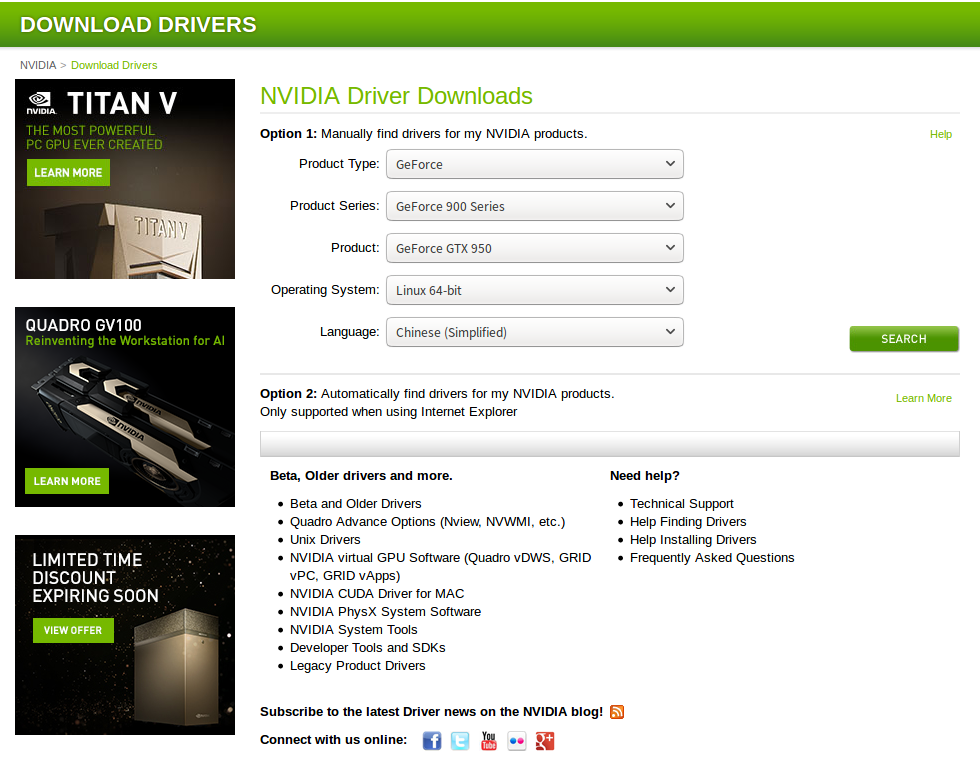Ubuntu16安装GPU版本TensorFlow(个人笔记本电脑)
想着开始学习tf了怎么能不用GPU,网上查了一下发现GeForce GTX确实支持GPU运算,所以就尝试部署了一下,在这里记录一下,避免大家少走弯路。
使用个人笔记本电脑thinkpadE570,内存4G,显卡GeForce GTX 950M
前期电脑已经安装win0+Ubuntu16双系统,thinkpad安装win0+Ubuntu16配置参照这里(本人为了方便)
安装顺序为:
(1)安装NVIDIA Driver
安装电脑对应的显卡驱动,安装完成能够在程序中找到NVIDIA。和windows驱动类似,不再赘述。
文件(GTX950):NVIDIA-Linux-x86_64-390.48.run
(2)安装CUDA,CUDA(Compute Unified Device Architecture),是英伟达公司推出的一种基于新的并行编程模型和指令集架构的通用计算架构,它能利用英伟达GPU的并行计算引擎,比CPU更高效的解决许多复杂计算任务。
不推荐sudo apt-get install nvidia-375安装,国内速度太慢,建议下载安装包,官网地址,选择选择runfile下载,
文件(GTX950):cuda_8.0.61_375.26_linux-run
(3)安装cuDNN,NVIDIA cuDNN是用于深度神经网络的GPU加速库。
直接下载同样非常慢,还需要注册,这里采用百度网盘上的,地址。
文件(GTX950):cudnn-8.0-linux-x64-v6.0.tgz
(4)安装gpu版本TensorFlow,下载地址,github地址:https://github.com/tensorflow/tensorflow
文件(GTX950):tf_nightly_gpu-1.head-cp27-none-linux_x86_64.whl
开始安装:
首先查看显卡信息
$sudo lshw -numeric -C display
description: 3D controller
product: GM107M [GeForce GTX 950M] [10DE:139A]
vendor: NVIDIA Corporation [10DE]
physical id: 0
bus info: pci@0000:01:00.0
version: a2
width: 64 bits
clock: 33MHz
capabilities: pm msi pciexpress bus_master cap_list
configuration: driver=nvidia latency=0
resources: irq:136 memory:f1000000-f1ffffff memory:c0000000-cfffffff memory:d0000000-d1ffffff ioport:d000(size=128)
$ ubuntu-drivers devices
== /sys/devices/pci0000:00/0000:00:1c.0/0000:01:00.0 ==
modalias : pci:v000010DEd0000139Asv000017AAsd0000505Cbc03sc02i00
vendor : NVIDIA Corporation
model : GM107M [GeForce GTX 950M]
driver : nvidia-361 - distro non-free
driver : nvidia-384 - third-party non-free recommended
driver : xserver-xorg-video-nouveau - distro free builtin
(1)安装驱动
sudo apt-get install nvidia-384
如果速度慢,官网下载,地址
选择合适的版本,然后用安装包安装。E570版本。
![]()
(2)安装CUDA
$ sudo sh cuda_8.0.61_375.26_linux-run --override然后安装引导界面,交互界面,开始的Install NVIDIA Accelerated Graphics Driver for Linux-x86_64 367.48?选择n,因为你已经安装驱动了。
Using more to view the EULA. End User License Agreement -------------------------- Preface ------- The following contains specific license terms and conditions for four separate NVIDIA products. By accepting this agreement, you agree to comply with all the terms and conditions applicable to the specific product(s) included herein. NVIDIA CUDA Toolkit Description The NVIDIA CUDA Toolkit provides command-line and graphical tools for building, debugging and optimizing the performance of applications accelerated by NVIDIA GPUs, runtime and math libraries, and documentation including programming guides, user manuals, and API references. The NVIDIA CUDA Toolkit License Agreement is available in Chapter 1. Default Install Location of CUDA Toolkit Windows platform: Do you accept the previously read EULA? accept/decline/quit: accept Install NVIDIA Accelerated Graphics Driver for Linux-x86_64 367.48? (y)es/(n)o/(q)uit: n Install the CUDA 8.0 Toolkit? (y)es/(n)o/(q)uit: y Enter Toolkit Location [ default is /usr/local/cuda-8.0 ]: Do you want to install a symbolic link at /usr/local/cuda? (y)es/(n)o/(q)uit: y Install the CUDA 8.0 Samples? (y)es/(n)o/(q)uit: y Enter CUDA Samples Location [ default is /home/kinny ]: Installing the CUDA Toolkit in /usr/local/cuda-8.0 ... Missing recommended library: libXmu.so Installing the CUDA Samples in /home/kinny ... Copying samples to /home/kinny/NVIDIA_CUDA-8.0_Samples now... Finished copying samples. =========== = Summary = =========== Driver: Not Selected Toolkit: Installed in /usr/local/cuda-8.0 Samples: Installed in /home/kinny, but missing recommended libraries Please make sure that - PATH includes /usr/local/cuda-8.0/bin - LD_LIBRARY_PATH includes /usr/local/cuda-8.0/lib64, or, add /usr/local/cuda-8.0/lib64 to /etc/ld.so.conf and run ldconfig as root To uninstall the CUDA Toolkit, run the uninstall script in /usr/local/cuda-8.0/bin Please see CUDA_Installation_Guide_Linux.pdf in /usr/local/cuda-8.0/doc/pdf for detailed information on setting up CUDA. ***WARNING: Incomplete installation! This installation did not install the CUDA Driver. A driver of version at least 361.00 is required for CUDA 8.0 functionality to work. To install the driver using this installer, run the following command, replacing <CudaInstaller> with the name of this run file: sudo <CudaInstaller>.run -silent -driver Logfile is /tmp/cuda_install_17494.log
加入环境变量:
export PATH="$PATH:/usr/local/cuda-8.0/bin"
export LD_LIBRARY_PATH="/usr/local/cuda-8.0/lib64"
$ nvidia-smi
Tue May 1 15:09:50 2018 +-----------------------------------------------------------------------------+ | NVIDIA-SMI 384.111 Driver Version: 384.111 | |-------------------------------+----------------------+----------------------+ | GPU Name Persistence-M| Bus-Id Disp.A | Volatile Uncorr. ECC | | Fan Temp Perf Pwr:Usage/Cap| Memory-Usage | GPU-Util Compute M. | |===============================+======================+======================| | 0 GeForce GTX 950M Off | 00000000:01:00.0 Off | N/A | | N/A 43C P5 N/A / N/A | 342MiB / 2002MiB | 8% Default | +-------------------------------+----------------------+----------------------+ +-----------------------------------------------------------------------------+ | Processes: GPU Memory | | GPU PID Type Process name Usage | |=============================================================================| | 0 1071 G /usr/lib/xorg/Xorg 49MiB | | 0 3202 G /usr/lib/xorg/Xorg 129MiB | | 0 3700 G compiz 114MiB | | 0 4084 G fcitx-qimpanel 8MiB | | 0 4754 G /usr/lib/firefox/firefox 1MiB | +-----------------------------------------------------------------------------+
安装成功!
(3)安装cuDNN
$ tar xvzf cudnn-8.0-linux-x64-v6.0.tgz $ sudo cp cuda/include/cudnn.h /usr/local/cuda/include $ sudo cp cuda/lib64/libcudnn* /usr/local/cuda/lib64 $ sudo chmod a+r /usr/local/cuda/include/cudnn.h /usr/local/cuda/lib64/libcudnn*
(4)安装TensorFlow
pip install wheel sudo pip install tf_nightly_gpu-1.head-cp27-none-linux_x86_64.whl export LD_LIBRARY_PATH="$LD_LIBRARY_PATH:/usr/local/cuda/lib64:/usr/local/cuda/extras/CUPTI/lib64" export CUDA_HOME=/usr/local/cuda
搞定!
(5) 错误处理
zh@zh-ThinkPad-E570:~$ python Python 2.7.12 (default, Nov 20 2017, 18:23:56) [GCC 5.4.0 20160609] on linux2 Type "help", "copyright", "credits" or "license" for more information. >>> import tensorflow Traceback (most recent call last): File "<stdin>", line 1, in <module> File "/usr/local/lib/python2.7/dist-packages/tensorflow/__init__.py", line 24, in <module> from tensorflow.python import * File "/usr/local/lib/python2.7/dist-packages/tensorflow/python/__init__.py", line 49, in <module> from tensorflow.python import pywrap_tensorflow File "/usr/local/lib/python2.7/dist-packages/tensorflow/python/pywrap_tensorflow.py", line 59, in <module> raise ImportError(msg) ImportError: Traceback (most recent call last): File "/usr/local/lib/python2.7/dist-packages/tensorflow/python/pywrap_tensorflow.py", line 48, in <module> from tensorflow.python.pywrap_tensorflow_internal import * File "/usr/local/lib/python2.7/dist-packages/tensorflow/python/pywrap_tensorflow_internal.py", line 28, in <module> _pywrap_tensorflow_internal = swig_import_helper() File "/usr/local/lib/python2.7/dist-packages/tensorflow/python/pywrap_tensorflow_internal.py", line 24, in swig_import_helper _mod = imp.load_module('_pywrap_tensorflow_internal', fp, pathname, description) ImportError: libcusolver.so.8.0: cannot open shared object file: No such file or directory Failed to load the native TensorFlow runtime. See https://www.tensorflow.org/install/install_sources#common_installation_problems for some common reasons and solutions. Include the entire stack trace above this error message when asking for help.
环境变量的问题,
zh@zh-ThinkPad-E570:~$ echo $LD_LIBRARY_PATH ”:/usr/local/cuda/lib64” zh@zh-ThinkPad-E570:~$ sudo ldconfig /usr/local/cuda/lib64
ok!




 浙公网安备 33010602011771号
浙公网安备 33010602011771号